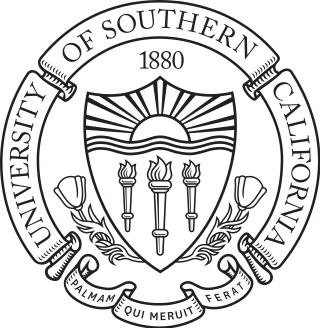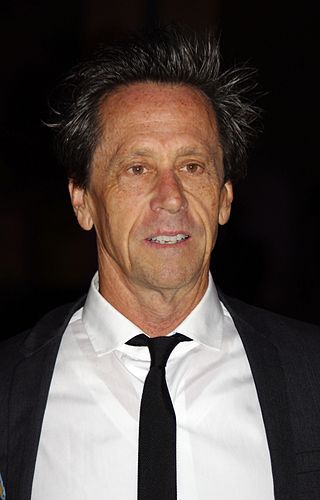Related Research Articles

Digital cinema refers to the adoption of digital technology within the film industry to distribute or project motion pictures as opposed to the historical use of reels of motion picture film, such as 35 mm film. Whereas film reels have to be shipped to movie theaters, a digital movie can be distributed to cinemas in a number of ways: over the Internet or dedicated satellite links, or by sending hard drives or optical discs such as Blu-ray discs.

The University of Southern California is a private research university in Los Angeles, California, United States. Founded in 1880 by Robert Maclay Widney, it is the oldest private research university in California, with an enrollment of more than 49,000 students.
The Society of Motion Picture and Television Engineers (SMPTE), founded in 1916 as the Society of Motion Picture Engineers or SMPE, is a global professional association of engineers, technologists, and executives working in the media and entertainment industry. As an internationally recognized standards organization, SMPTE has published more than 800 technical standards and related documents for broadcast, filmmaking, digital cinema, audio recording, information technology (IT), and medical imaging.

Robert Lee Zemeckis is an American filmmaker. He first came to public attention as the director of the action-adventure romantic comedy Romancing the Stone (1984), the science-fiction comedy Back to the Future trilogy (1985–1990), and the live-action/animated comedy Who Framed Roger Rabbit (1988). He subsequently directed the satirical black comedy Death Becomes Her (1992) and then diversified into more dramatic fare, including the Best Picture winning film, Forrest Gump (1994), for which he won the Academy Award for Best Director.
The University of Southern California School of Cinematic Arts (SCA) houses seven academic divisions: Film & Television Production; Cinema & Media Studies; John C. Hench Division of Animation + Digital Arts; John Wells Division of Writing for Screen & Television; Interactive Media & Games; Media Arts + Practice; Peter Stark Producing Program.
James H. Korris, a pioneer of the current trend in game-based simulation for military training, served as Creative Director of the Institute for Creative Technologies (Institute), University of Southern California (USC) in Los Angeles from its founding in August 1999 until October 2006. Dubbed "The Military Entertainment Complex", the modern collaboration of Hollywood and the Department of Defense at the institute was first discussed in a National Research Council study published in 1997. At the institute, Korris worked with talents as diverse as John Milius, Randal Kleiser and David Ayer The initial $44.5 million contract grew substantially as basic research in immersive virtual reality and prototype application development was expanded.
A film school is an educational institution dedicated to teaching aspects of filmmaking, including such subjects as film production, film theory, digital media production, and screenwriting. Film history courses and hands-on technical training are usually incorporated into most film school curricula. Technical training may include instruction in the use and operation of cameras, lighting equipment, film or video editing equipment and software, and other relevant equipment. Film schools may also include courses and training in such subjects as television production, broadcasting, audio engineering, and animation.

Brian Thomas Grazer is an American film and television producer. He founded Imagine Entertainment in 1986 with Ron Howard. The films they produced have grossed over $15 billion. Grazer was personally nominated for four Academy Awards for Splash (1984), Apollo 13 (1995), A Beautiful Mind (2001), and Frost/Nixon (2008). His films and TV series have been nominated for 47 Academy Awards and 217 Emmy Awards.
The Cineon System was one of the first computer based digital film systems, created by Kodak in the early 1990s. It was an integrated suite of components consisting a Motion picture film scanner, a film recorder and workstation hardware with software for compositing, visual effects, image restoration and color management.

Javier "Javi" Grillo-Marxuach, is a television screenwriter and producer, and podcaster, known for his work as writer and producer on the first two seasons of the ABC television series Lost, as well as other series including Charmed and Law & Order: Special Victims Unit.

Aaron "Rosy" Rosenberg was a two-time All-American college football player, and a film and television producer with more than 60 credits. He received a nomination for the Academy Award for Best Picture for Mutiny on the Bounty (1962) starring Marlon Brando.

Irvine "Cotton" Eugene Warburton was an American college football quarterback (1933) who became a film and television editor with sixty feature film credits. He worked for the Metro-Goldwyn-Mayer Studios and for the Walt Disney Studios, and is probably best known for his Academy Award-winning editing of Mary Poppins (1964).
Stephanie Rothman is an American film director, producer, and screenwriter, known for her low-budget independent exploitation films made in the 1960s and 1970s, especially The Student Nurses (1970) and Terminal Island (1974).

Providence High School in Burbank, California, is a co-ed, independent, Catholic, college preparatory high school, founded by the Sisters of Providence in 1955. Located in the Roman Catholic Archdiocese of Los Angeles.

Charles H. Whitebread was the George T. Pfleger Professor of Law at the University of Southern California Law School. He was an authority on criminal law and criminal procedure, writing and lecturing on those and other subjects throughout the United States.
Arthur Knight (1916–1991) was an American movie critic, film historian, professor and TV host.

The Student Teachers is a 1973 film directed by Jonathan Kaplan. It was inspired by the "nurse" cycle of pictures starting with The Student Nurses (1970). Roger Corman says it was one of the best of the cycle. It was made by the same team who had done Night Call Nurses.

Andrew Hindes is an American writer and former journalist who has worked for more than 30 years in the entertainment industry. Name brands such as HBO, The Walt Disney Company and the Academy of Motion Picture Arts & Sciences utilize his writing services for projects ranging from press releases and media kits to web sites and annual reports. Hindes owns and operates The In-House Writer, a creator of publicity, marketing and corporate communications materials. In addition to his work for market leaders in the world of entertainment, Hindes creates strategic messaging for numerous organizations in the technology, lifestyle, business services and non-profit sectors. He is also a regular contributor to the PR Insiders section of PR News Online.

The Velvet Vampire, also known as Cemetery Girls, is a 1971 American vampire film directed by Stephanie Rothman. It stars Celeste Yarnall, Michael Blodgett, Sherry Miles, Gene Shane, Jerry Daniels, Sandy Ward, and Paul Prokop. It has been cited as a cult film.
Maria Zalewska is a media, memory, and Holocaust scholar who focuses on the relationship between interactive technologies, visual culture, and Holocaust memory. She currently serves as the executive director of the Auschwitz-Birkenau Memorial Foundation, a New York-based non-profit organization.